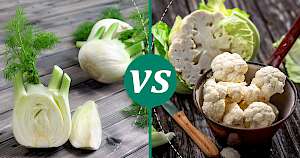Cauliflower vs Fennel: Nutrition, Calories & Protein Compared


Cauliflower vs Fennel
Nutrition Facts
Serving size:
change
5g10g15g20g30g40g50g60g80g100g120g140g160g180g200g220g250g300g350g400g450g500g600g700g800g900g1000g
1oz2oz3oz4oz5oz6oz7oz8oz10oz12oz15oz20oz25oz30oz35oz40oz50oz
Amount Per Serving:
Serving size:
change
5g10g15g20g30g40g50g60g80g100g120g140g160g180g200g220g250g300g350g400g450g500g600g700g800g900g1000g
1oz2oz3oz4oz5oz6oz7oz8oz10oz12oz15oz20oz25oz30oz35oz40oz50oz
Amount Per Serving:
Cauliflower vs Fennel 100g Compare
| per 100g | Cauliflower | Fennel |
|---|---|---|
| Calories | 25 | 31 |
| Carbohydrates | 4.97 g | 7.29 g |
| Fat | 0.28 g | 0.2 g |
| Dietary fiber | 2 g | 3.1 g |
| Protein | 1.92 g | 1.24 g |
| Calcium | 22 mg | 49 mg |
| Iron | 0.42 mg | 0.73 mg |
| Magnessium | 15 mg | 17 mg |
| Potassium | 299 mg | 414 mg |
| Sodium | 30 mg | 52 mg |
| Zink | 0.27 mg | 0.2 mg |
| Vitaminium B1 (Thiamine) | 0.05 mg | 0.01 mg |
| Vitaminium B2 (riboflavin) | 0.06 mg | 0.032 mg |
| Vitaminium B3 (Niacin) | 0.507 mg | 0.64 mg |
| Vitaminium B5 | 0.667 mg | 0.232 mg |
| Vitaminium B6 | 0.184 mg | 0.047 mg |
| Vitaminium B9 (Folic acid) | 57 mg | 27 mg |
| Vitaminium C | 48.2 mg | 12 mg |
Exploring the Nutritional Landscape: Cauliflower and Fennel
When it comes to selecting vegetables for your diet, the choices can be both exciting and a bit overwhelming. Two standout options that have captured the attention of health enthusiasts and culinary experts alike are cauliflower and fennel. Each brings a unique set of flavors, textures, and nutritional benefits to the table, making them versatile ingredients in a variety of dishes. But how do they compare when it comes to their nutritional profiles? Let's dive into the world of cauliflower and fennel to discover their health benefits and culinary uses.
A Closer Look at Cauliflower
Cauliflower, a member of the cruciferous vegetable family, is well-known for its versatility and health benefits. It can be roasted, steamed, mashed, or even transformed into rice and pizza crusts. Nutritionally, cauliflower is low in calories, with just 25 calories per 100 grams, making it an excellent choice for weight management. It's also a good source of vitamins C and K, and minerals like calcium and potassium. With 4.97 grams of carbohydrates, 2 grams of fiber, and 1.92 grams of protein, cauliflower supports digestive health and provides a moderate amount of plant-based protein.
Diving Into Fennel
Fennel, with its distinctive licorice flavor, is a bulbous vegetable that belongs to the carrot family. It's not only the bulb that's edible; the stalks, leaves, and seeds are also used in cooking, offering a plethora of flavors and textures. Fennel is slightly higher in calories than cauliflower, with 31 calories per 100 grams. However, it's richer in fiber (3.1 grams) and contains more calcium and iron, making it beneficial for bone health and oxygen transport in the body. Fennel also provides a variety of vitamins and minerals, including a higher amount of vitamin A and potassium compared to cauliflower.
Nutritional Face-Off
- Calories and Macronutrients: Cauliflower is lower in calories and carbohydrates but slightly higher in protein. Fennel, on the other hand, offers more fiber, which is crucial for digestive health.
- Minerals: Fennel takes the lead in calcium, iron, magnesium, and potassium, which are vital for various bodily functions including heart health, muscle function, and bone density.
- Vitamins: Cauliflower is an excellent source of vitamin C, crucial for immune health, while fennel offers a good dose of vitamin A, important for vision and skin health.
Which One Should You Choose?
The decision between cauliflower and fennel may come down to your specific nutritional needs and taste preferences. If you're looking for a low-calorie, high-protein option with a boost of vitamin C, cauliflower might be your best bet. However, if you're in need of a fiber-rich vegetable that supports bone health and offers a unique flavor profile, fennel could be the way to go. Ultimately, incorporating a variety of vegetables into your diet, including both cauliflower and fennel, is the best strategy for achieving optimal health and enjoying the diverse flavors that nature has to offer.
In conclusion, both cauliflower and fennel offer unique nutritional benefits and culinary versatility. Whether you're crafting a savory soup, a refreshing salad, or a hearty main dish, these vegetables can enhance your meals while contributing to your overall health. So, why not experiment with both and discover the many delicious possibilities they have to offer?
Cauliflower 100g
25kcalCalories source
- 66% CARBS.
- 26% PROTEIN
- 8% FAT
Fennel 100g
31kcalCalories source
- 81% CARBS
- 14% PROTEIN
- 5% FAT
Compares of cauliflower
- Cauliflower vs Artichoke
- Cauliflower vs Arugula
- Cauliflower vs Asparagus
- Cauliflower vs Beetroot
- Cauliflower vs Bitter Melon
- Cauliflower vs Bok Choy
- see all compares of cauliflower
Marcin Piotrowicz
calories-info.com creator
Healthy diet and healthy lifestyle promoter
Add comment